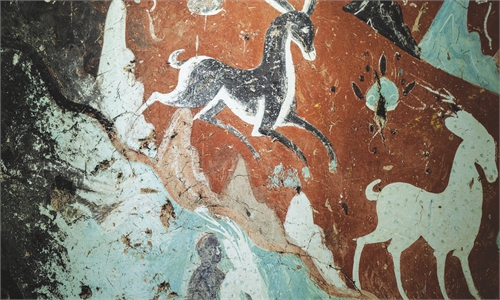ARTS / CULTURE & LEISURE
The less biased a vlogger’s lens, the truer the picture of China

Illustration: Liu Xiangya/Global Times
Over the one week or so since the Global Times first focused on the influx of foreign backpackers in China - seen in the many vlogs they post on video-sharing platforms - their curiosity and fondness toward this vast and fast-changing country have brought them closer to the borders and deeper into the society.Their works not only help global audiences have a better glimpse of the real China, but for Chinese viewers it is also refreshing to see the country from a new perspective. Their China videos have attracted more traffic as the videos' viewership is noticeably bigger than previous works. Some videos have gained 2 million views on YouTube.
During the past week, one of these foreign vloggers delved into the real Chinese countryside and bumped into a Dragon Boat race in East China's Fujian Province, while another ventured into the much-defamed Xinjiang Uygur Autonomous Region.
Indeed many foreign netizens are curious about Chinese village life and the "tension" in certain regions due to Western media's years of bad-mouthing and politicization of issues in these regions. Some netizens left comments under these vloggers' previous videos, asking them to explore more destinations other than shiny big cities.
One vlogger's unexpected encounter with a Dragon Boat race in a small village is my personal favorite video. Young locals and elderly villagers crowd along the bank of a small lake cheering for the contestants, while they smile and welcome the stranger apparently from a foreign country. How lucky are these vloggers! Northern folks like myself rarely get to see a dragon boat race in person since they mostly take place in the south.
As seen from his latest videos, one Indian vlogger is still enjoying the food and local people's hospitality in Kashi, Xinjiang. The guy randomly visited a local resident's home out of curiosity and received a warm reception. He showed them how to dance like in Bollywood movies and learned a few words in Uygur. As he roams around the old town of Kashi while vlogging among the locals and tourist crowds, any viewer can make a true judgment on what they see.
The people of China welcome anyone to visit the country and have a close-up look at any corner, as long as one maintains an unbiased open attitude.
One vlogger's venture in Zhangjiajie, Hunan Province, was simply breathtaking - hiking on the lush southern mountains, at one time crossing a section as if he was hanging on the mountain cliff. I have to admit I haven't been to that many unique places in China, so the courage of the vlogger has paid off, since the scenery from his vantage point makes it all worthwhile. It must have been this same courage that made these vloggers want to come to see China with their own eyes instead of through the lens of Western media.
"A lot of people are saying that I am praising China too much. I am praising China so much because I didn't know China was like this. I was expecting something else. It turned out to be very different," one vlogger said in a video as he walks along the streets of Hangzhou.
So far, their respective journeys have taken viewers to Dandong, a city bordering North Korea, Kashi in Xinjiang and the Shaolin Temple in Central China, besides the metropolises and tech-hubs like Shenzhen, Chongqing and Xi'an.
Among all the backpackers in China, why do Indian vloggers stand out in both visibility online and viewership? From my personal experience, Indian travelers in China have a bigger presence on video-sharing platforms and they have larger numbers of followers. As I initially enjoyed watching the videos from three Indian vloggers, the platform continued to present to me more works by other Indian creators on my homepage. So far at least six Indian creators currently touring around China regularly appear on this page.
It's also because Indian vloggers are enthusiastic and informative, and they narrate a lot while shooting videos, giving a fuller picture of the place they visit and how they feel inside India's important yet somewhat unfamiliar neighbor.
The author is an editor with the Global Times. life@globaltimes.com.cn

